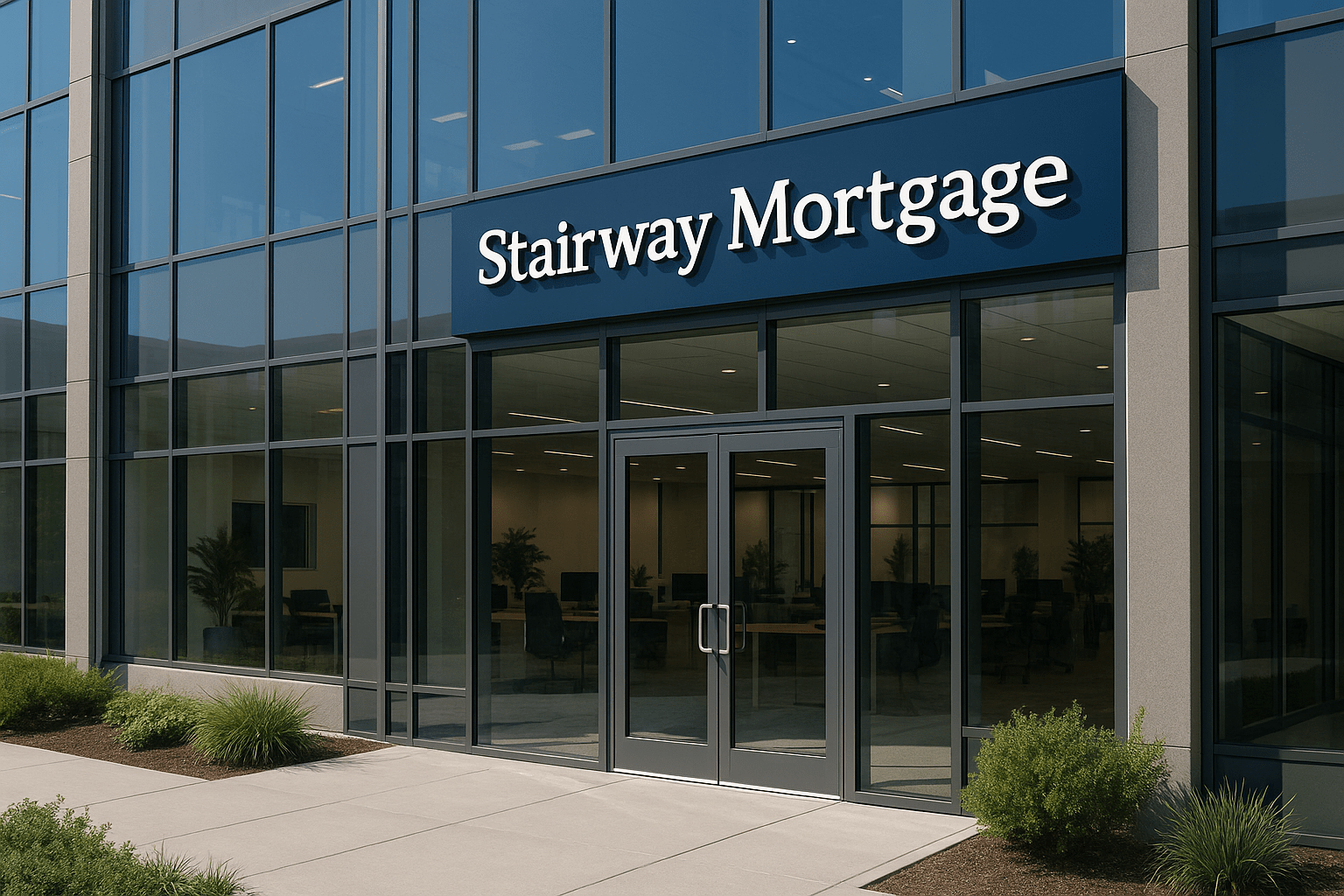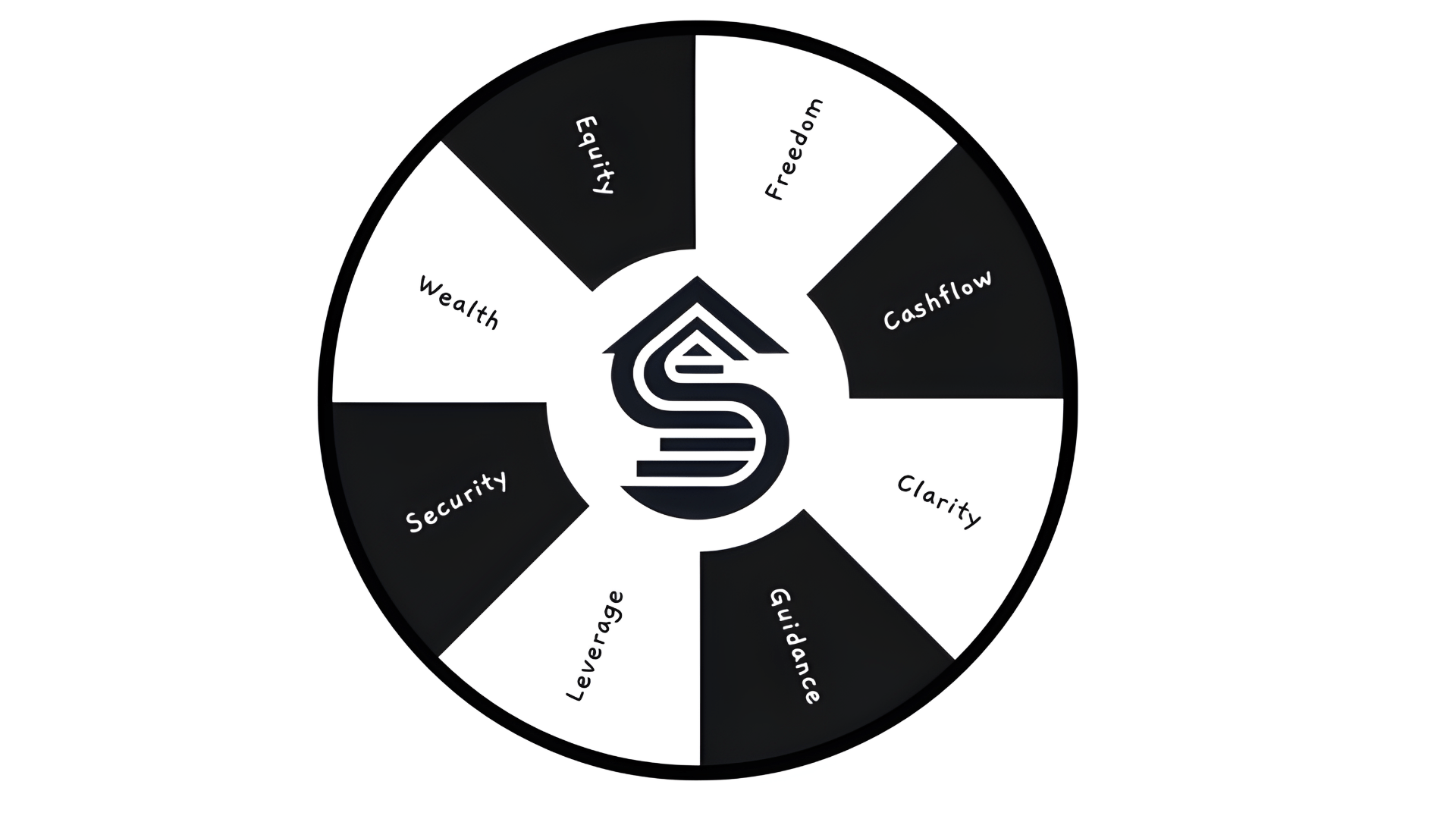Mortgage Preapproval: How to Get Preapproved in 24 Hours at Stairway
Mortgage Preapproval: How to Get Preapproved in 24 Hours at Stairway

Getting preapproved for a mortgage before you start house hunting isn’t just a smart move—it’s essential in today’s competitive real estate markets. Yet most buyers either skip this step entirely or settle for weak prequalifications that don’t impress sellers.
The difference between a strong preapproval and no preapproval (or a weak one) often determines whether you win or lose the home you want. Sellers prioritize offers from buyers who’ve done their homework and can close quickly with certainty.
In this guide, you’ll discover:
- How preapproval differs from prequalification and why the distinction matters to sellers (according to CFPB mortgage guidance)
- What documents you need and how to gather them efficiently (per Fannie Mae underwriting standards)
- The step-by-step preapproval process from application to approval letter
- How Stairway’s hybrid broker-direct lender model enables 24-hour preapprovals without sacrificing thoroughness
- What happens after preapproval and how to maintain your approved status (following FHA loan guidelines)
Whether you’re a first-time buyer competing against experienced purchasers, an investor moving quickly on opportunities, or anyone who wants maximum negotiating power, understanding how preapproval works—and how to get it fast—gives you a significant advantage.
Questions about your situation? Schedule a call to speak with a loan advisor.

What Is Mortgage Preapproval?
Before we explore how to get preapproved quickly, let’s clarify exactly what preapproval means and why it matters so much.
Preapproval: Your Financial Verification
What does mortgage preapproval involve? Preapproval is a comprehensive evaluation of your financial situation by a lender. It includes:
- Reviewing your credit history and scores
- Verifying your income through pay stubs, tax returns, or other documentation
- Confirming your assets through bank statements and investment accounts
- Analyzing your debt-to-income ratio
- Determining the maximum loan amount you qualify for
- Issuing a written preapproval letter stating your approved amount
Why is this different from casual estimates? Preapproval involves actual underwriter review of your documentation. A real person with lending authority has examined your financial profile and determined you’re qualified to borrow a specific amount, subject to finding an acceptable property and maintaining your financial status.
What does your preapproval letter tell sellers? It demonstrates:
- You’re a serious buyer, not a window shopper
- A lender has verified your financial qualifications
- You can actually close the transaction
- Your financing is unlikely to fall through
- You can move quickly since most verification is complete
How Does Preapproval Differ from Prequalification?
What’s prequalification? Prequalification is a preliminary estimate based on information you provide verbally or through a quick online form. Key characteristics:
- No documentation review
- No credit check (usually)
- No underwriter involvement
- Takes minutes, not hours or days
- Provides a rough estimate of borrowing capacity
- Not verified or guaranteed
What’s preapproval? Preapproval is verified qualification based on actual documentation. Key characteristics:
- Complete documentation reviewed
- Credit report pulled and analyzed
- Underwriter evaluates your file
- Takes hours to days
- Provides a specific, verified loan amount
- Written commitment (subject to conditions)
Why does this distinction matter to sellers? Sellers and their agents know the difference. A prequalification letter suggests you might be able to buy. A preapproval letter confirms you can buy. In competitive situations, offers with strong preapprovals win over offers with only prequalifications.
When might prequalification be useful? Early in your journey when you’re just exploring possibilities and want a rough idea of your budget. But once you’re ready to shop seriously, upgrade to full preapproval.
What a Strong Preapproval Letter Demonstrates
What makes a preapproval letter “strong”?
Specific loan amount – Not a range, but a clear maximum: “Preapproved for financing up to [amount].”
Thorough verification statement – Language indicating documentation has been reviewed: “Based on verified income, assets, and credit.”
Lender credibility – The lender’s reputation matters. Agents recognize lenders with track records of reliable closings versus those who overstate qualifications.
Clear conditions – Any remaining requirements stated explicitly: “Subject to acceptable property appraisal and title.”
Reasonable validity period – Typically valid for 60-90 days, showing current verification.
Why do these elements matter? Listing agents advise sellers on which offers to accept. A strong preapproval letter from a credible lender makes your offer stand out as low-risk and reliable.
Ready to explore your options? Use our calculator to see how different loan programs compare for your situation.
Why Preapproval Matters Before You House Hunt
Getting preapproved before you start looking at homes isn’t just good practice—it’s essential for several strategic reasons.
Know Your Budget Before You Fall in Love
What’s the risk of shopping first? Many buyers start viewing homes before understanding what they can actually afford. The inevitable result:
You fall in love with a home beyond your budget. Now you’re emotionally attached to something you can’t have. Everything in your actual price range feels disappointing by comparison.
How does preapproval prevent this? You know your maximum purchase price before you start shopping. You can focus on homes you can actually afford, avoiding emotional attachment to properties beyond your reach.
What about stretching your budget? Sometimes buyers want to push their maximum. Preapproval shows you exactly where that maximum is based on lender guidelines, your income, and your debts. You can make informed decisions about what’s realistic versus what’s wishful thinking.
Does your maximum mean you should spend that much? Absolutely not. Your lender might approve you for more than you’re comfortable spending. Many smart buyers get preapproved for their maximum, then shop for less—giving themselves financial breathing room and faster equity building.
How Do Sellers View Preapproved Buyers?
What signals does preapproval send?
Serious intent – You’ve invested time and effort into verification. You’re not casually browsing; you’re ready to buy.
Financial credibility – A lender has confirmed you can perform. Your offer isn’t contingent on “hoping” you’ll qualify.
Transaction certainty – Most of the financing verification is complete. The risk of your financing falling through is minimal.
Quick closing potential – Since income and asset verification are done, your loan can process faster than a non-preapproved buyer’s loan.
Professional approach – You’ve done your homework. Sellers and agents appreciate working with informed, prepared buyers.
Why does this matter in practice? When sellers receive multiple offers, they evaluate not just price but reliability. A slightly lower offer from a strongly preapproved buyer often beats a higher offer from an unverified buyer. Sellers want certainty, not just promises.
Gaining Negotiating Power in Competitive Markets
How does preapproval strengthen your negotiating position?
Reduced contingencies – Your financing contingency period can be shorter since you’re already verified. This makes your offer more attractive than buyers needing extended financing contingency periods.
Faster closing timelines – You can offer to close in three weeks instead of five or six. In many situations, this speed advantage is worth thousands to the seller.
Credibility in multiple offer situations – When five buyers submit offers, listing agents advise sellers to prioritize offers with strong preapprovals from reputable lenders. Your offer rises to the top of consideration.
Inspection and appraisal leverage – Sellers are more willing to negotiate repairs or credits with buyers they know can close. If you’re strongly preapproved, they’re less likely to walk away from negotiations.
What about waiving contingencies? Some competitive buyers waive financing contingencies entirely to strengthen offers. This is risky—never do it without solid preapproval and understanding the implications. But with strong preapproval, the risk is lower because you’re confident in your qualification.
Avoiding Heartbreak and Wasted Time
What happens when you shop without preapproval?
You find your perfect home. You write an offer. You enter contract. Then during the financing process, you discover:
- You don’t actually qualify for that price range
- Your debt-to-income ratio is too high
- Your credit isn’t as strong as you thought
- Your income documentation doesn’t meet lender requirements
What’s the result? Your financing falls through. You lose the home. You’ve wasted weeks of your time and the seller’s time. Your earnest money might be at risk. You’re emotionally devastated.
How does preapproval prevent this? These issues surface during preapproval, before you’re in contract. If problems exist, you address them before shopping, not after finding your dream home.
What if you need to improve your financial position? Better to discover this during preapproval when you have time to:
- Pay down debts to improve your debt-to-income ratio
- Save additional down payment
- Resolve credit issues
- Gather better income documentation
- Wait for a better employment situation
Why is this timing crucial? Finding out you need six more months to qualify is disappointing during preapproval. Finding out after you’re in contract on your perfect home is devastating.
Have questions about the process? Schedule a consultation to get personalized guidance.
What You Need for Mortgage Preapproval
Understanding what documentation you’ll need helps you gather everything efficiently and speeds up your preapproval timeline.
Income Documentation
What do lenders need to verify your income? The specific documents depend on your employment type.
W-2 Employees
If you receive traditional W-2 income, you’ll typically provide:
- Most recent pay stubs covering at least 30 days
- W-2 forms from the previous two years
- Tax returns from the previous two years (sometimes required, especially for commissioned or bonus income)
- Verification of employment – Your lender may contact your employer directly to confirm employment and income
What if you have multiple jobs? Provide documentation for all income sources you want considered for qualification.
What about bonuses and commissions? Lenders typically require two-year history to count this income as stable and continuing.
Self-Employed Borrowers
If you’re self-employed, own a business, or work as a 1099 contractor, documentation becomes more extensive:
- Personal tax returns from the previous two years with all schedules
- Business tax returns from the previous two years (1120, 1120S, or 1065)
- Year-to-date profit and loss statement
- Business bank statements (for some loan programs like bank statement loans)
- Business license or documentation proving business existence
Why do self-employed borrowers need more documentation? Lenders need to verify income stability and calculate your actual qualifying income after business expenses.
What if traditional documentation doesn’t show your true income? This is where working with a broker who has access to alternative documentation lenders helps. Bank statement loan programs and 1099 loan programs offer options when standard documentation doesn’t reflect your capacity to repay.
Other Income Sources
What other income can be counted?
- Rental income from investment properties (with documentation of lease agreements and tax returns showing rental income)
- Social Security or pension income (with award letters or statements)
- Alimony or child support (with divorce decree or separation agreement, plus proof of receipt)
- Investment income (dividends, interest – shown on tax returns)
- VA disability income (with award letter)
What can’t be counted? Income that isn’t documented, verifiable, or likely to continue typically can’t be used for qualification.
Asset Documentation
Why do lenders need to verify your assets? They want to confirm:
- You have funds for down payment and closing costs
- You have reserves (savings beyond what you need for the transaction)
- The funds are from acceptable sources
What asset documentation is required?
Bank statements – Most recent 60 days for all accounts:
- Checking accounts
- Savings accounts
- Money market accounts
Investment accounts – Most recent statements for:
- Brokerage accounts
- Retirement accounts (401k, IRA, etc.)
- Stocks and bonds
Gift funds – If receiving gift money for down payment:
- Gift letter from donor
- Documentation showing transfer of funds
- Donor’s bank statement proving ability to gift
What do lenders look for in bank statements? They verify:
- Sufficient funds for down payment and closing
- Seasoned funds (money that’s been in your accounts, not suddenly deposited)
- No unusual large deposits requiring explanation
- Consistent balances showing financial stability
What if you have large recent deposits? Be prepared to explain their source with documentation. Lenders need to verify money isn’t borrowed (which would count as additional debt) or from unacceptable sources.
Credit Authorization
What happens with your credit during preapproval?
Credit report pull – You’ll authorize the lender to pull your credit report from all three bureaus (Equifax, Experian, TransUnion).
Credit score calculation – Lenders use the middle score from the three bureaus for qualification.
Credit history review – Underwriters examine:
- Payment history on all accounts
- Outstanding debt balances
- Credit utilization
- Recent credit inquiries
- Any derogatory marks (late payments, collections, etc.)
Does preapproval hurt your credit? The hard inquiry may cause a temporary small decrease, but the impact is minimal and temporary. The benefit of preapproval far outweighs this minor effect.
What about multiple preapprovals? If you’re shopping lenders, multiple mortgage credit inquiries within a short period (typically 45 days) count as a single inquiry. This is designed to encourage rate shopping.
Identity Verification
What identification documents are required?
- Government-issued photo ID (driver’s license or passport)
- Social Security card or verification of Social Security number
- Proof of residency (for some loan types)
Why is identity verification critical? Both for fraud prevention and to comply with federal lending regulations.
Additional Items for Specific Situations
What other documentation might you need?
If you’re divorced:
- Divorce decree
- Separation agreement
- Documentation of alimony or child support payments (paid or received)
If you’re a veteran:
- DD-214 (Certificate of Release or Discharge from Active Duty)
- COE (Certificate of Eligibility) for VA loans
If you’ve had past credit issues:
- Letter of explanation for any derogatory marks
- Documentation showing circumstances and resolution
If you’re buying investment property:
- Current lease agreements if you own other rentals
- Tax returns showing rental income history
If the property is a condo:
- HOA documentation
- Condo questionnaire or certification
See yourself in these scenarios? Get pre-approved to start your journey.

How the Preapproval Process Works Step-by-Step
Understanding each stage of preapproval helps you know what to expect and how to move through the process efficiently.
Step 1: Initial Application Submission
What happens first?
You complete a mortgage application providing:
- Personal information (name, address, employment)
- Income details
- Asset information
- Current debts and obligations
- Property information (if you know what you’re buying)
- Desired loan amount and program
How long does the application take? With modern digital applications, most borrowers complete this in 15-30 minutes. You can save progress and return if you need to gather information.
What if you don’t know all the answers? Your loan advisor helps you complete the application accurately. Don’t guess—if you’re uncertain about something, ask.
Step 2: Document Collection and Submission
What happens after application?
Your loan advisor provides a checklist of required documents based on your specific situation. You gather and upload:
- Pay stubs and W-2s (or tax returns if self-employed)
- Bank statements
- ID and Social Security card
- Any additional situation-specific documents
How quickly should you provide documents? The faster you submit complete documentation, the faster you receive preapproval. Delays in document submission are the most common cause of slow preapprovals.
What if documents are unclear or incomplete? Your processor reviews everything and requests clarification or additional documentation if needed. Clear, complete documents mean faster processing.
Can you upload documents from your phone? Yes—modern platforms allow you to photograph documents with your phone and upload them securely. No need for scanning or special equipment.
Step 3: Credit and Income Verification
What happens with your documentation?
Credit analysis – Underwriters review:
- Your credit scores across all three bureaus
- Payment history and any derogatory marks
- Outstanding debt and monthly obligations
- Recent credit inquiries
Income calculation – Underwriters verify:
- Employment stability and continuity
- Income amount and likelihood of continuation
- Qualifying income after deductions (especially for self-employed)
- Income from all sources you want considered
Asset verification – Underwriters confirm:
- Sufficient funds for down payment and closing
- Required reserves after closing
- Source of all funds
- Explanation for any unusual deposits
Employment verification – Lenders contact employers to confirm:
- Current employment status
- Position and salary
- Employment start date
- Likelihood of continued employment
Step 4: Underwriter Review and Decision
Who makes the preapproval decision?
An underwriter—a specialized professional trained in mortgage lending guidelines—reviews your complete file. They evaluate:
Can this borrower repay the loan? Based on income, employment stability, and financial history.
Will this borrower repay the loan? Based on credit history and demonstrated responsibility with debt.
What’s the maximum loan amount? Based on income, debts, and down payment.
What conditions are needed? Any additional documentation or verification required.
What can slow down this stage?
- Incomplete or unclear documentation
- Complex income scenarios requiring careful analysis
- Unusual situations requiring additional review
- High volume periods when underwriters are backlogged
What speeds it up?
- Complete, clear documentation
- Straightforward financial situations
- Direct lending operations with in-house underwriters
- Responsive borrowers who provide requested items quickly
Step 5: Preapproval Letter Issued
What happens when you’re approved?
You receive a preapproval letter stating:
- Maximum loan amount you’re approved for
- Loan program (FHA, conventional, etc.)
- Down payment amount
- Any conditions remaining (typically property-related)
- Validity period (usually 60-90 days)
How do you use this letter?
- Provide to your real estate agent
- Submit with purchase offers
- Show sellers you’re qualified and serious
Can the letter be updated? Yes—if you want to offer on a property at a different price point, or if you find a home shortly before your letter expires, your lender can update it quickly.
Ready to explore your options? Use our calculator to see how this works for your situation.
How Long Does Preapproval Take?
Timeline expectations vary significantly based on lender type and your specific situation. Let’s break down realistic timelines and what affects them.
Traditional Lender Timelines
How long do banks and credit unions typically take?
Standard timeline: 3-7 business days for straightforward scenarios
Why does it take this long?
- Applications queue for review
- Documentation manually reviewed
- Credit checks processed
- Employment verification completed
- Underwriters work through backlog
- Multiple handoffs between departments
What extends traditional timelines?
- Complex income documentation (self-employed borrowers)
- High volume periods (spring buying season)
- Incomplete documentation requiring follow-up
- Credit issues requiring additional review
- Understaffed departments or inefficient processes
When do traditional lenders move faster? When you have perfect credit, traditional W-2 employment, substantial assets, and complete documentation—the “ideal” borrower profile.
Traditional Broker Timelines
How long do typical mortgage brokers take?
Standard timeline: 2-5 business days for most scenarios
Why are brokers sometimes faster than banks?
- Specialized focus on mortgage origination
- Efficient processes optimized for volume
- Access to multiple lenders with varying capacity
- Experience with diverse scenarios
What slows brokers down?
- Coordination with third-party wholesale lenders
- Waiting for lender underwriter availability
- Communication delays between broker and lender
- Multiple approval layers
When do traditional brokers excel? Complex scenarios where they can strategically place you with the right specialized lender immediately.
The Stairway 24-Hour Advantage
How does Stairway deliver preapprovals in 24 hours or less?
This is where our hybrid broker-direct lender model creates significant competitive advantage. Here’s how:
Our Direct Lending Operation
When we process through our direct lending arm:
- In-house underwriting – No waiting for third-party lender availability. Our underwriters work your file immediately.
- Dedicated processing team – Processors focus exclusively on moving files efficiently through each stage.
- Advanced technology – Automated document recognition, digital verification systems, and streamlined workflows eliminate manual delays.
- Experienced decision-makers – Underwriters with authority to make approval decisions quickly without excessive approval layers.
- Priority processing – Time-sensitive situations get expedited attention.
What enables same-day preapprovals? For straightforward scenarios with complete documentation submitted early in the day, our team can often deliver preapproval by end of business—sometimes within hours.
Why can we promise 24 hours? We’ve built infrastructure specifically to deliver this speed:
- Adequate staffing to handle volume without backlogs
- Technology that automates routine verification
- Experienced team that identifies issues quickly
- Efficient processes refined over billions in loan volume
Our Broker Network Flexibility
When we place loans with our lender network:
Even when using wholesale lenders, we’ve cultivated relationships with lenders who share our commitment to speed:
- Preferred partner status – High volume lenders prioritize our files
- Direct underwriter relationships – We can escalate when speed matters
- Lender matching expertise – We know which lenders process specific scenarios fastest
- Streamlined communication – Efficient processes for submitting files and receiving decisions
When do we use the network versus direct lending? We evaluate what serves you best:
- Need maximum speed? Direct lending operation
- Need specialized program? Network lender with that specialty
- Need absolute best pricing? Compare our direct rates against network options
The Scale Advantage
Why does our volume matter for speed?
Having reached over eight billion dollars in annual originations (as discussed in our broker versus lender comparison), we’ve invested in:
- Technology infrastructure that major banks use—document management, automated verification, real-time status tracking
- Staffing depth ensuring no single processor or underwriter is overwhelmed
- Process optimization refined over thousands of loans
- Systems redundancy so no single bottleneck delays everything
What does this mean practically? You’re not waiting for “the underwriter” to get to your file. You’re in a well-oiled system designed for efficient, high-volume processing without sacrificing quality.
What Can Slow Down Your Preapproval?
What factors affect any preapproval timeline?
Documentation delays – If you don’t provide requested documents promptly, your timeline extends regardless of lender efficiency.
Incomplete information – Missing pages from statements, unclear document quality, or incomplete forms require follow-up requests.
Complex income scenarios – Self-employed borrowers, 1099 contractors, or those with unusual income sources require more analysis time.
Credit complications – Past credit issues, recent late payments, or high debt levels require additional underwriter review and possibly letters of explanation.
Employment verification issues – If your employer is slow to respond to verification requests, this delays the process.
High volume periods – Even efficient lenders experience higher volume during peak buying seasons (spring and summer).
How can you minimize delays?
- Submit complete, clear documentation immediately
- Respond promptly to any requests
- Ensure your employer responds quickly to verification calls
- Be available for questions during the review process
- Choose a lender with efficient processes (like Stairway’s 24-hour standard)
Have questions about the process? Schedule a consultation to get personalized guidance.
How Stairway’s Preapproval Process Stands Out
Beyond speed, several aspects of our preapproval approach create advantages for borrowers.
Our 24-Hour Standard Process
What does our typical 24-hour preapproval look like?
Hour 0 – Application submission: You complete your online application and upload initial documentation.
Hours 1-4 – Initial review: Your loan advisor reviews your application for completeness and requests any additional needed documents. You upload remaining items.
Hours 5-8 – Credit and verification: We pull your credit, verify employment, and confirm assets. Processors organize your complete file.
Hours 9-20 – Underwriter review: An underwriter evaluates your complete financial profile and determines approval amount and conditions.
Hours 21-24 – Letter issued: You receive your preapproval letter, typically via email, ready to use with purchase offers.
What if you submit your application late in the day? The 24-hour clock starts when you complete documentation, not when you begin the application. If you submit everything at 4 PM, you’ll typically receive preapproval by 4 PM the next business day.
Can it happen faster? Yes—for straightforward scenarios with complete documentation submitted early in the day, we often deliver same-day preapprovals.
Hybrid Model = Maximum Flexibility
How does our broker-direct lender model benefit your preapproval?
Option A: Direct Lending Speed
When speed is critical:
- Processing through our direct lending operation
- In-house underwriting
- Fast approval and strong letter
- Typical for time-sensitive buyers in competitive markets
Option B: Strategic Network Placement
When specialized programs matter:
- Access to 300+ wholesale lenders
- Strategic placement with lenders specializing in your scenario
- Competitive pricing through lender competition
- Typical for complex income situations or specialized loans
Option C: Comparison and Choice
When you want options:
- Receive preapproval for multiple programs
- Compare conventional, FHA, and other options
- See pricing across different lenders
- Choose the combination that serves you best
Why is flexibility valuable? Different buyers have different priorities. First-time buyers in hot markets need speed. Self-employed buyers need specialized lenders. Investors need optimal pricing. Our model serves all these needs.
Strong Preapproval Letters That Win
What makes Stairway preapproval letters particularly strong?
Specific and clear – We state your exact approved amount, not a range. Sellers know precisely what you can pay.
Verified documentation statement – Our letters explicitly state that income, assets, and credit have been verified by an underwriter.
Lender reputation – Real estate agents in markets where we operate recognize our name as a reliable lender that closes deals. This credibility strengthens your offers.
Appropriate conditions – We clearly state remaining conditions (typically property appraisal and title), so sellers understand what’s required to close.
Professional presentation – Our letters are clear, professional, and contain all information sellers and their agents need to evaluate your offer’s strength.
Quick updates – Need the letter revised for a different property price? We can update it within hours, not days.
Ongoing Support After Preapproval
What happens after you receive your preapproval letter?
Active house hunting support:
- Questions about how specific homes fit your preapproval
- Guidance on offer strategies
- Updates to preapproval if needed
- Property-specific qualification questions
Maintaining your preapproval:
- Reminders about actions to avoid (don’t make large purchases, don’t change jobs without discussing)
- Credit monitoring to catch any issues
- Updates if your financial situation changes
Transition to purchase:
- When you go under contract, seamless transition to full loan processing
- No need to restart documentation—we have everything
- Faster processing since preapproval work is complete
What if you don’t find a home quickly?
- We stay in touch throughout your search
- Update your preapproval as it nears expiration
- Re-verify documentation if needed after 90 days
- Continue answering questions and providing guidance
Easy Updates and Modifications
What if your situation changes during house hunting?
Income increases – New job with higher salary? We’ll update your preapproval to reflect your new maximum.
Additional assets – Received a bonus or gift funds? We can increase your preapproval amount or reduce required down payment.
Credit improvements – Paid off debts? Your qualifying ratios improve, potentially increasing your approval amount.
Different price ranges – Found a home that’s less expensive than your maximum? We’ll adjust your letter to the actual purchase price.
Loan program changes – Want to compare FHA versus conventional? We can provide letters for different programs.
How quickly can updates happen? Most updates require only underwriter review of the change, not complete re-underwriting. We typically provide updated letters within hours.
See yourself in these scenarios? Get pre-approved to start your journey.

Common Preapproval Scenarios
Let’s explore how preapproval works for different types of buyers and situations.
First-Time Buyers: Building Confidence
Sarah, age 28, first-time buyer saved diligently for her down payment. She had good credit but felt overwhelmed by the homebuying process and uncertain about how much she could afford.
Her preapproval process: Sarah completed her application on Tuesday morning and uploaded all requested documents by Tuesday afternoon. Her income was straightforward W-2 employment, her assets clear in her savings account, and her credit strong.
Timeline: She received preapproval Wednesday afternoon—roughly 28 hours from application start.
The impact: With preapproval letter in hand, Sarah felt confident shopping for homes. She knew her exact budget and could make offers knowing sellers would take her seriously. When she found her home, her agent emphasized her strong preapproval in the offer. Despite two other offers, Sarah won because sellers trusted her financing would close quickly.
Self-Employed Buyers: Finding the Right Program
Marcus, age 35, owns a digital marketing agency. His business is successful with strong cash flow, but his tax returns show substantial write-offs that reduced his adjusted gross income. Traditional banks declined him based on his tax returns.
His preapproval strategy: Working with Stairway’s network of lenders, Marcus used a bank statement loan program that evaluated his business bank deposits rather than tax returns.
Timeline: Because this required specialized lender expertise and different documentation review, Marcus’s preapproval took three business days—still faster than traditional banks, and with an approval those banks couldn’t provide.
The result: Marcus qualified for a substantial loan amount reflecting his actual capacity to repay, not his tax-minimized reported income. He purchased a home that fit his true financial strength.
Buyers with Past Credit Challenges
Jennifer, age 42, went through a difficult divorce three years ago that resulted in some late payments and a foreclosure. She’d since rebuilt her financial life with stable employment, savings, and on-time payments.
Her preapproval approach: Stairway’s underwriters reviewed her complete credit story, not just her scores. She provided a letter explaining circumstances, documentation showing current stability, and evidence of responsible credit management since the divorce.
Timeline: The additional review and explanation letter meant Jennifer’s preapproval took 48 hours rather than 24, but still much faster than traditional lenders who often take a week for complex credit situations.
Why it worked: By placing Jennifer with a lender who understood that past credit events in context don’t predict future behavior, she received approval with reasonable terms. Traditional bank guidelines would have automatically declined her.
Investment Property Preapprovals
David, age 48, owns two rental properties and wants to purchase a third. He’s employed full-time but wants to use a DSCR loan that qualifies him based on the property’s rental income potential, not his personal income.
His preapproval process: David needed preapproval that accounted for rental income from his existing properties and qualified him based on the new property’s income potential.
Timeline: This specialized scenario required coordination with DSCR lenders and analysis of rental income. David’s preapproval took two business days.
The advantage: David received preapproval for investment property financing that let him move quickly when he found properties with strong cash flow potential. His existing rental portfolio strengthened rather than hindered his qualification.
Quick-Closing Competitive Market Buyers
Michael and Amanda, both age 31, were competing in a hot real estate market where homes received multiple offers. They knew they’d need to offer quick closing to compete against all-cash buyers.
Their preapproval strategy: They worked through Stairway’s direct lending operation to get fast preapproval and positioned themselves for quick closing.
Timeline: With complete documentation submitted in the morning, they received preapproval the same afternoon—less than 8 hours.
The result: When they found their home with four other interested buyers, they offered a 21-day closing. Their strong preapproval from a lender known for fast, reliable closings gave sellers confidence. Despite not having the highest offer, they won because sellers valued speed and certainty.
Ready to explore your options? Use our calculator to see how this works for your situation.
What Happens After You’re Preapproved?
Receiving your preapproval letter is a major milestone, but it’s not the finish line. Here’s what to expect and how to maintain your approved status.
How Long Is Your Preapproval Valid?
What’s a typical preapproval validity period?
Most preapprovals remain valid for 60-90 days from the date of issuance. This timeframe reflects:
- How long credit reports remain current (typically 120 days)
- How long income and asset verification remains relevant
- Reasonable house hunting timelines
What happens when your preapproval nears expiration?
30 days before expiration: Your loan advisor typically contacts you to discuss your house hunting progress and whether you’ll need an extension.
At expiration: If you haven’t found a home yet and want to continue shopping, you’ll need updated documentation:
- Updated credit report (soft pull that doesn’t impact your score significantly)
- Recent pay stubs
- Updated bank statements
- Verification that employment continues
How long does renewal take? Usually much faster than initial preapproval since we already know your situation—often within hours if nothing has changed significantly.
What if your financial situation changed? Any material changes (new job, new debts, change in income) require new underwriter review. This might extend your renewal timeline but ensures your preapproval remains accurate.
House Hunting with Confidence
How do you use your preapproval while shopping?
Provide to your real estate agent immediately – They’ll submit it with all your offers, establishing credibility with listing agents.
Mention preapproval in conversations – When viewing homes, let listing agents know you’re preapproved and ready to move quickly.
Focus on homes within your preapproval amount – Stay at or below your maximum to ensure you can close.
Ask property-specific questions – Before making an offer, confirm with your lender that specific properties qualify (some property types have restrictions).
Understand your negotiating position – Your preapproval strengthens your offers. Don’t be afraid to negotiate knowing you can actually close.
What should you avoid while house hunting?
Don’t make large purchases – Buying cars, furniture, or other major items changes your debt-to-income ratio and can invalidate your preapproval.
Don’t change jobs without discussing – Employment changes require new verification and sometimes affect qualification. Talk to your lender before accepting new positions.
Don’t open new credit accounts – New credit cards, personal loans, or other accounts change your credit profile and debt ratios.
Don’t make unusual financial moves – Large cash deposits, transfers between accounts, or closing accounts can all require explanation and potentially delay closing.
Don’t assume approval means you must buy – Preapproval gives you the option to buy. You can continue renting, keep saving, or wait for better market conditions if that serves you better.
Making Offers with Your Preapproval
How does preapproval strengthen your offers?
Shorter financing contingency periods – Standard offers might include 30-45 day financing contingencies. With preapproval, you can offer 21 days or less since most verification is complete.
Quick closing timelines – You can offer to close in 3-4 weeks rather than 6-8 weeks. Many sellers value speed highly.
Stronger negotiating position – Sellers and listing agents take your offers more seriously knowing you’re verified and can close.
Reduced seller anxiety – Sellers worry about deals falling through due to financing. Your preapproval reduces that fear significantly.
What should your offer include?
Your real estate agent will submit:
- Your purchase offer
- Your preapproval letter
- Sometimes: Proof of funds (bank statement showing down payment availability)
- Sometimes: Cover letter from your agent emphasizing your strong financing
Can you waive financing contingencies? Some buyers in extremely competitive markets waive financing contingencies entirely. This is risky—never do it without:
- Strong preapproval with thorough documentation review
- Understanding that you could lose earnest money if financing falls through
- Discussion with your lender about how confident they are in approval
- Legal counsel about implications
From Preapproval to Final Approval
What’s the difference between preapproval and final approval?
Preapproval evaluates you as a borrower: your income, assets, credit, and general qualifications.
Final approval evaluates the complete transaction: you PLUS the specific property you’re buying.
What additional items are needed for final approval?
Property-specific items:
- Purchase contract
- Property appraisal
- Title search and insurance
- Homeowners insurance
- Property inspections (sometimes required by lenders)
- Condo or HOA documentation (if applicable)
Updated borrower items:
- Recent pay stubs (if time has passed since preapproval)
- Updated bank statements
- Credit refresh
- Final employment verification (typically day before closing)
How long does final approval take after contract? With preapproval complete, most of the remaining work is property-related. Typical timeline from contract to closing is 21-30 days, though Stairway’s efficient processes often enable faster closing when needed.
What Could Cause Preapproval to Be Withdrawn?
What situations might invalidate your preapproval?
Employment changes – Losing your job, changing to lower income, or moving to new unrelated employment can affect qualification.
New debt – Taking on car loans, student loans, credit card debt, or other obligations increases your debt-to-income ratio.
Large purchases – Major purchases that deplete your down payment funds or create new monthly obligations.
Credit changes – New late payments, collections, or other negative credit events.
Asset changes – If your down payment funds aren’t where you said they’d be, or if you’ve transferred money making it hard to trace sources.
Undisclosed information – If anything in your application was inaccurate or incomplete and the truth comes out during final approval.
How can you protect your preapproval status?
✅ Maintain consistent employment ✅ Avoid new debt ✅ Continue paying all bills on time ✅ Keep down payment funds in documented accounts ✅ Don’t make large deposits without explanation ✅ Communicate with your lender about any changes ✅ Follow your lender’s guidance throughout house hunting
Have questions about maintaining your preapproval? Schedule a consultation to get personalized guidance.
Ready to Get Preapproved in 24 Hours?
Understanding mortgage preapproval—what it is, why it matters, what you need, and how it works—positions you to move forward confidently and efficiently.
Here’s your path to preapproval:
Start Your Application: Complete your online application in 15-30 minutes. Provide accurate information about your income, assets, employment, and desired loan amount.
Submit Documentation: Upload your documents securely from your phone or computer. The faster you provide complete documentation, the faster you receive preapproval.
Receive Your Preapproval: With Stairway’s 24-hour standard, you’ll typically have your preapproval letter within one business day for straightforward scenarios. Complex situations might take 2-3 days but still move faster than traditional lenders.
Start House Hunting: With your preapproval letter, you can shop confidently knowing your budget, making strong offers that sellers take seriously.
Why get preapproved now?
Markets change. Interest rates fluctuate. Your perfect home could appear tomorrow. Being preapproved means you’re ready to act when opportunity presents itself. You’re not scrambling to get financing while someone else’s offer gets accepted.
Your next steps:
- Get Pre-Approved and receive your letter in 24 hours
- Schedule a Call to discuss your specific situation and timeline
- Use Our Calculator to estimate your potential loan amount
- See Success Stories from preapproved buyers who won their homes
- Take Our Discovery Quiz to identify your ideal loan programs
Questions about preapproval? Schedule a call with a loan advisor who can walk you through the process.

Frequently Asked Questions About Mortgage Preapproval
Does Preapproval Hurt My Credit Score?
Will getting preapproved damage my credit? Preapproval requires a hard credit inquiry, which may cause a small, temporary decrease in your credit score—typically less than 5 points.
How temporary is the impact? The effect diminishes over several months and is usually negligible after six months. The inquiry remains on your credit report for two years but stops affecting your score much sooner.
Is the benefit worth the small credit impact? Absolutely. The competitive advantage and negotiating power from preapproval far outweighs the minimal credit score effect. Without preapproval, you might lose homes to other buyers—a much larger cost than a few credit points.
What if I want to shop multiple lenders? Multiple mortgage credit inquiries within 45 days typically count as a single inquiry for scoring purposes. This is specifically designed to encourage rate shopping without penalty. Shop as many lenders as you want within that window.
Can I Get Preapproved with Multiple Lenders?
Should I get preapproved by several lenders? Yes, shopping lenders is smart. It lets you compare:
- Interest rates and fees
- Loan programs and options
- Service quality and responsiveness
- Processing speed and efficiency
Will multiple preapprovals hurt my credit? As mentioned above, inquiries within 45 days count as one inquiry for most credit scoring models.
How do I compare preapprovals? Look at:
- Actual approved amounts (not just estimates)
- Interest rates and APR
- Fees and closing costs
- Lender reputation and reliability
- Quality of service and communication
- Processing speed
Should I tell lenders I’m shopping? Yes—reputable lenders expect and encourage rate shopping. Be transparent that you’re comparing options. Good lenders welcome the competition.
What’s the Difference Between Preapproval and Conditional Approval?
What is conditional approval? Conditional approval (also called “approved with conditions”) comes after you’re under contract on a specific property. It means:
- You’re approved for this specific transaction
- Subject to meeting stated conditions
- Conditions typically property-related (clear appraisal, clear title, etc.)
- Very close to final approval
How does it differ from preapproval?
Preapproval:
- Before you find a property
- Evaluates you as a borrower
- Property-agnostic
- “You can borrow up to X amount”
Conditional approval:
- After you’re under contract
- Evaluates you + specific property
- Property-specific
- “This specific loan is approved pending these conditions”
Which is stronger? Conditional approval is closer to final approval, but you can’t get it until you’re under contract. Preapproval is what you need for house hunting.
Can I Get Preapproved If I’m Self-Employed?
Is preapproval possible for self-employed buyers? Absolutely—self-employed borrowers get preapproved regularly. The process requires different documentation and sometimes takes slightly longer.
What’s different for self-employed preapproval?
Documentation needed:
- Two years of personal tax returns
- Two years of business tax returns
- Year-to-date profit and loss statement
- Business bank statements (for some programs)
Income calculation:
- Lenders analyze your tax returns carefully
- They calculate qualifying income after business expenses
- They verify income stability and continuity
- They might average income across two years
Alternative programs:
- Bank statement loans use bank deposits instead of tax returns
- 1099 loans work for contractors
- Asset-based loans qualify you based on assets rather than income
Why work with a broker? Brokers have access to multiple lenders with different approaches to self-employed income. If one lender’s guidelines don’t work well for you, another’s might. This optionality is valuable for self-employed buyers.
How Accurate Is My Preapproval Amount?
Is my preapproval amount guaranteed? Your preapproval amount is accurate based on the information and documentation provided, subject to:
- Information remaining accurate (no job changes, new debts, etc.)
- Property meeting lender requirements
- Appraisal supporting your purchase price
- No negative changes to credit
Could my approval amount change? Yes, in these situations:
Increases:
- Your income increases
- You pay off debts
- You add gift funds or other assets
- Your credit improves
Decreases:
- Property appraises below purchase price
- You take on new debt
- Your credit worsens
- Your income or employment changes negatively
- Property doesn’t meet lender requirements
How can you ensure accuracy? Provide complete, accurate information during preapproval and maintain your financial status throughout house hunting.
What If I Find a House Over My Preapproval Amount?
Can you purchase above your preapproval maximum? Maybe, in these scenarios:
If you add more down payment – Your preapproval was based on a certain down payment amount. If you can put down more, your loan amount can stay the same while your purchase price increases.
If you added income sources – Got a raise? Started a side job? New income might increase your maximum.
If you paid off debts – Reducing monthly obligations improves your debt-to-income ratio and might increase your maximum.
If you qualify for a different program – Sometimes switching from conventional to FHA or vice versa changes maximums due to different qualification ratios.
What if none of these apply? If you truly can’t qualify for the higher amount, you have two choices:
- Look for homes within your preapproved amount
- Work on improving your financial position and get reapproved later at a higher amount
The risk of stretching: Even if you can barely qualify for a higher amount, consider whether you’re comfortable with that payment long-term. Just because you qualify doesn’t mean you should maximize your borrowing.
Can Preapproval Be Done Entirely Online?
Can you complete preapproval without ever talking to anyone? Many lenders, including Stairway, offer fully digital preapproval processes:
✅ Online application ✅ Digital document upload ✅ E-signatures for authorizations ✅ Electronic delivery of preapproval letter
Should you talk to someone even if you don’t have to? We recommend at least one conversation with your loan advisor because:
- They can answer questions that online FAQs miss
- They might identify strategies or programs you didn’t know about
- They can explain your specific situation’s nuances
- They’ll be your point of contact once you find a home
What’s the best balance? Use digital tools for efficiency (application, document upload, status tracking) but don’t hesitate to call or video chat when you need human expertise and guidance.
Still have questions? Schedule a call with a loan advisor who specializes in preapprovals and can address your specific situation.
Also Helpful for Homebuyers
If you’re exploring mortgage preapproval, these related topics will help you understand the complete picture:
- How to Apply for a Mortgage – See how preapproval fits into the overall mortgage application process.
- Mortgage Broker vs Lender – Understand why our hybrid model enables faster preapprovals than traditional lenders.
- Best Mortgage Company – Learn about our technology, team, and mission that make 24-hour preapprovals possible.
- Understanding Mortgage Broker Fees – See complete transparency about costs and how our pricing works.
- FHA Loan Programs – Explore one of the most popular preapproval programs for first-time buyers.
NEXA Mortgage: The Systems That Enable 24-Hour Preapprovals
How can Stairway Mortgage deliver preapprovals so quickly without sacrificing thoroughness? We operate as a division of NEXA Mortgage, giving us access to sophisticated technology systems and experienced underwriting teams that process applications efficiently. NEXA’s automated verification systems can pull and analyze your credit, income, and asset data rapidly, while their skilled underwriters review your complete financial picture to issue legitimate preapproval letters that sellers and listing agents recognize and respect. This combination of advanced technology and human expertise means your documentation gets reviewed thoroughly but quickly, typically within 24 hours when you provide complete information. The partnership also gives us direct lending capabilities, allowing us to issue preapprovals with confidence backed by our own lending authority rather than relying solely on third-party lender commitments.
What’s “NEXA” in Your Homebuying Journey?
With preapproval in hand, you’re positioned to shop confidently and make strong offers. Here’s how preapproval connects to your next steps:
For First-Time Buyers: Now that you understand preapproval, explore which loan programs fit your situation best and get preapproved to start shopping.
For Move-Up Buyers: If you’re selling one home and buying another, preapproval helps you time both transactions and know your exact budget for your next home.
For Real Estate Investors: Investment property preapprovals work differently—explore DSCR loans and get preapproved based on property income potential.
For Self-Employed Buyers: Understanding preapproval options like bank statement loans helps you see paths to approval traditional banks miss.
Explore Your Complete Options
Ready to get preapproved and see all your options? Use these resources:
- All Loan Programs – Browse every loan type available and see which you might qualify for.
- All Case Studies – Read stories of buyers who used strong preapprovals to win homes in competitive markets.
- All Calculators – Estimate your potential loan amount and monthly payments before applying.
- Discovery Quiz – Answer a few questions to identify which loan programs match your situation.
- Get Local Introductions – Connect with real estate agents who work with preapproved buyers.
Need a Pre-Approval Letter—Fast?
Buying a home soon? Complete our short form and we’ll connect you with the best loan options for your target property and financial situation—fast.
- Only 2 minutes to complete
- Quick turnaround on pre-approval
- No credit score impact
Got a Few Questions First?
Let’s talk it through. Book a call and one of our friendly advisors will be in touch to guide you personally.
Schedule a CallNot Sure About Your Next Step?
Skip the guesswork. Take our quick Discovery Quiz to uncover your top financial priorities, so we can guide you toward the wealth-building strategies that fit your life.
- Takes just 5 minutes
- Tailored results based on your answers
- No credit check required
Related Posts
Subscribe to our newsletter
Get new posts and insights in your inbox.







